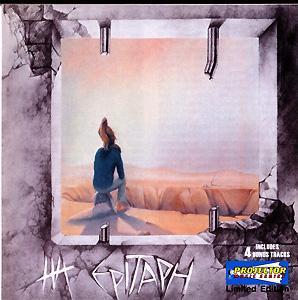|
|
|
01 |
Moving To The Country |
|
|
|
05:14 |
|
|
02 |
Visions |
|
|
|
05:27 |
|
|
03 |
Hopelessly |
|
|
|
08:16 |
|
|
04 |
Little Maggie |
|
|
|
08:32 |
|
|
05 |
Early Morning |
|
|
|
10:04 |
|
|
06 |
London Town Girl |
|
|
|
03:28 |
|
|
07 |
Visions, Single Version |
|
|
|
04:35 |
|
|
08 |
I'm Trying |
|
|
|
05:33 |
|
|
09 |
Changing World |
|
|
|
05:50 |
|
|
|
| Country |
Germany |
| Spars |
DDD |
| Sound |
Stereo |
|
|
|
EPITAPH
Personnel:
· CLIFF JACKSON v, g
· BERND KOLBE b, mellotron, v
· KLAUS WALZ g, v
· (JIM MCGILLIVRAY d) A
· (ACHIM WIELERT d) B
· NORBERT LEHMANN d C
ALBUMS (up to '76):
1. (A)same (Polydor 2371 225) 1971
2. (A)"Stop, Look & Listen" (Polydor 2371 274) 1972
3. (B)"Outside The Law" (Billingsgate BG 1009) 1974
NB: The sampler Handicap (Babylon 80.002) (2 LP) (1979)included 4 of the 5 tracks from their first album, the whole second album, the single A side "London Girl" and two previously unreleased tracks "I'm Trying" and "Changing World", presumablya lost single.
There are many editions of 3: A promo edition of 1,000 copies on Billingsgate with a white cover, Billingsgate inner sleeve and label logo in typed letters.
The 1974 re-issue on Membran 22-131-1 used the white cover. A second re-issue on Babylon 80.001 in 1979 again used the black and white cover, but had no fold-out!
British progressive heavy rock bands like Deep Purple, Black Sabbath, Uriah Keep and Led Zeppelin inspired many young bands in Germany. The Germans usually preferred to use English lyrics, and several bands, like Blackwater Park, 2066 & Then and Epitaph, had British vocalists! Epitaph were founded in Dortmund in 1969. The first sessions for their debut album, released 1971 on Polydor, were recorded in an Essex studio in England. For reasons unknown to me, it was however finished in Windrose Studios, Hamburg, where a fourth member was added to the group: Klaus Walz. The five resulting tracks sounded similar to the groups mentioned above, and particularly the earliest incarnation of Uriah Heep. Epitaph's Cliff Jackson didn't attempt to copy Byron's operatic vocal style, though. There were both fast rock'n'roll numbers and slow ballads with mellotron textures, usually in the 'heavy progressive standard song length' - from 5 to 7 minutes. In 1972, Epitaph recorded their second album Stop, Look And Listen in Audio Tonstudio, Berlin. This album also contained five tracks, stylistically similar to their first offering. Both albums are recommended for fans of the heavy progressive genre. In early 1973, Epitaph released two non-LP singles on the Polydor subsidiary Zebra: "Autumn '71" coupled with "Are You Ready" (2047 003) and "We Love You Alice" coupled with "Paradise For Sale" (2047 005). After this promising start, it seems as if the band was promised a bright future by the newly founded American record company Billingsgate, that they eventually signed to. The band invested much time and money into their third album Outside The Law (1974), and aimed at an international break-through. On this album, McGillivray was replaced with Achim Wielert. The music sounded more polished this time, as the band abandoned progressive elements for a more straight forward heavy rock style. Sadly all their dreams of success were brutally shattered, as Billingsgate soon went bankrupt and all their money was lost. Epitaph had laid out on an extensive (and expensive) USA promotional tour (with ex-Karthago member Norbert Lehmann on drums) in October 1974 - on their return they had to sell their gear to survive! Their new album was part of the bankrupt estate of Billingsgate, and Epitaph were forced to disband in 1975. The band secretly reformed later the same year, but didn't record any further albums until 1979.
